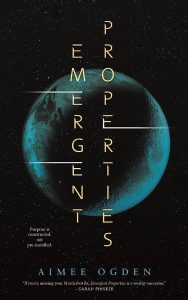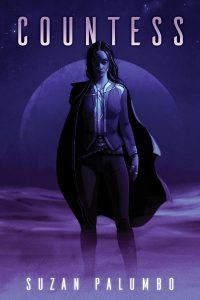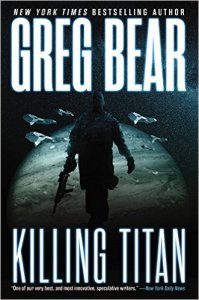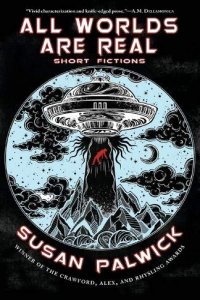Alexandra Pierce Reviews Emergent Properties by Aimee Ogden
 Emergent Properties, Aimee Ogden (Tordotcom 978-1-25086-681-3, 128pp, $16.99 tp) July 2023.
Emergent Properties, Aimee Ogden (Tordotcom 978-1-25086-681-3, 128pp, $16.99 tp) July 2023.
Parent and parental figures may have hopes, expectations, and even plans for their offspring. However, I expect all of us know that those hopes, expectations, and plans do not necessarily match what the offspring themselves do; I’ve never met a person who has not, as some point, done something that surprised or dismayed a parental type. In Emergent Properties (which follows on from Ogden’s debut novella, Sun-Daughters, Sea-Daughters from 2021), Scorn is no different. The only thing that makes zir choices remarkable is that ze is one of the world’s few emancipated AIs.
In a time when discussion of machine learning and AI is increasingly moving into public debate, Emergent Properties poses a familiar enough question – what if, like human children, our AI offspring don’t do what we expect? – but Ogden doesn’t take the (well-worn) Skynet route. Scorn has no interest in destroying humanity; ze just wants to do zir own thing without zir mothers interfering. Bridget and Zahra intended Scorn for interplanetary exploration, but as the novella’s tagline suggests, though, ‘‘purpose is constructed, not pre-installed.’’ Scorn really doesn’t care about interplanetary research, finding zemself much more interested in human social structures. Which is why the story opens with Scorn discovering that ze is missing nearly a million seconds from zir backups, and that ze is currently swimming in a server in Alberta, and that ze has apparently suffered a rather ignominious disaster on the moon. Does ze remember what happened on the moon? No. Does ze even remember why ze was on the moon? Also no. Will ze be retracing all of zir steps, attempting to reconstruct zir investigation, and returning to the moon as soon as possible to both figure out what’s going on there and what happened to zir? Of course.
Emergent Properties is a novella, so there’s not space for deep investigation of lots of issues. Ogden does, though, gesture towards several. AI rights, of course – what are the necessary conditions for emancipation to be appropriate? There’s also transnational corporations being deeply problematic, nation-states probably on the way out, and the migration and resettlement of large groups of humans. Closer to home, for Scorn, is the problem of family and their dynamics: in particular, parents who are famous and whose split has been the sort of acrimonious that gets into the gossip pages. All of these contribute to zir experiences both on Earth and on the moon.
One of the obvious comparisons to make at the moment is between Scorn and Martha Wells’s Murderbot, and there are certainly similarities: both have some ‘‘human’’ characteristics, neither is actually ‘‘human,’’ and neither wants to be. They also end up in dangerous situations where their ‘‘artificial’’ (for want of a better word) nature is key to survival. One of the key issues for both is their embodied nature, but here their differences far outweigh the similarities. Murderbot passes as human when it wants to, despite its squeamishness at doing so, and exists inside its cyborg body. Scorn, however, can exist as a disembodied consciousness when necessary – witness waking up in an Alberta server. Ze does prefer to be embodied, but unlike Murderbot, ze has choices, though limited to zir bank account and whatever chassis are available wherever ze wants to be. Chassis don’t even need to be humanform: spiderbots, for instance, are very useful for getting into small spaces, although they do run the risk of being squished by humans (deliberately or accidentally). Older-model humanforms, on the other hand, while having some advantages, also lead to difficult questions along the lines of ‘‘Who is your owner?’’ As ways of exploring ‘‘constructed’’ intelligence, Scorn and Murderbot present very different possibilities.
This is an impressive addition to the AI-as-central-character canon. It’s both character-driven and a fast-paced investigation. I’m looking forward to more crunchy stories from Ogden.
Alexandra Pierce reads, writes, podcasts, cooks and knits; she’s Australian and a feminist. She was a host of the Hugo Award winning podcast Galactic Suburbia for a decade; her new podcast is all about indie bookshops and is called Paper Defiance. Alex has edited two award-winning non-fiction anthologies, Letters to Tiptree and Luminscent Threads: Connections to Octavia E Butler. She reviews a wide range of books at www.randomalex.net.
This review and more like it in the July 2023 issue of Locus.
 While you are here, please take a moment to support Locus with a one-time or recurring donation. We rely on reader donations to keep the magazine and site going, and would like to keep the site paywall free, but WE NEED YOUR FINANCIAL SUPPORT to continue quality coverage of the science fiction and fantasy field.
While you are here, please take a moment to support Locus with a one-time or recurring donation. We rely on reader donations to keep the magazine and site going, and would like to keep the site paywall free, but WE NEED YOUR FINANCIAL SUPPORT to continue quality coverage of the science fiction and fantasy field.
©Locus Magazine. Copyrighted material may not be republished without permission of LSFF.








“Ze/zir”